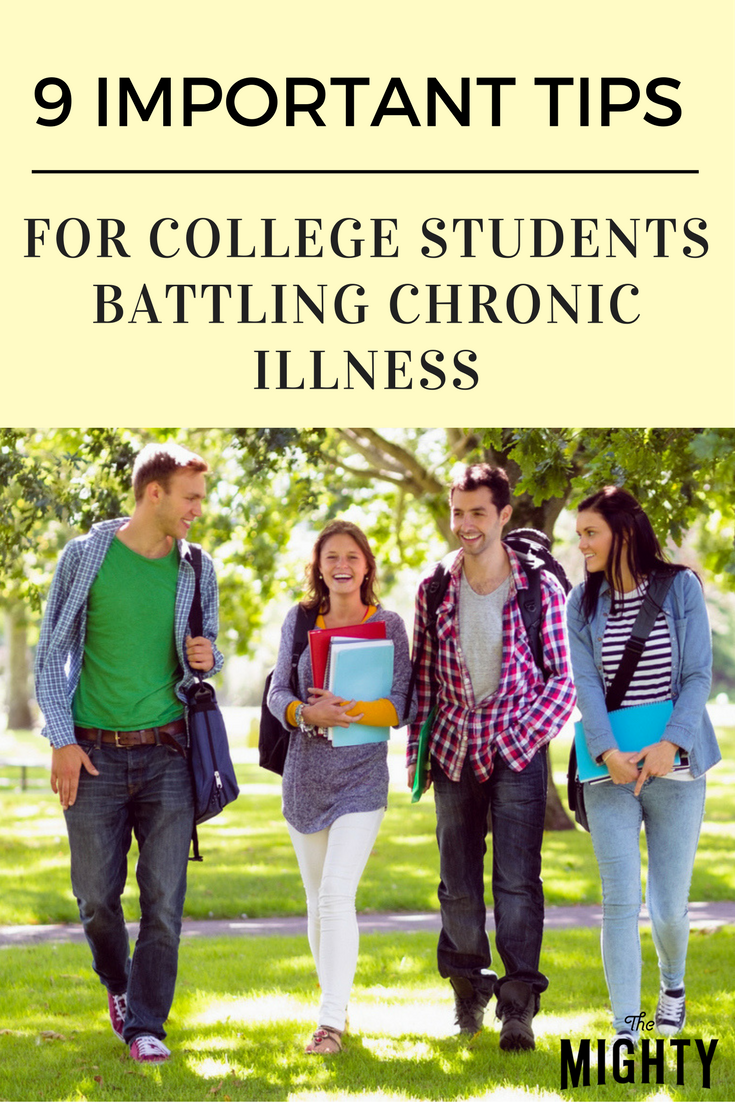People frequently ask me how I balance and manage so many conditions while taking on college too. There are many strategies, but these are some of the best, most practical tips.
1. Meet with the disabilities office on your campus a few months before you are scheduled to start classes as a freshman. Every university in the United States, under the Americans with Disabilities Act of 1990 (ADA), is required to provide such services. Meeting before the start of
the academic year is an excellent opportunity to get to know your disabilities counselor. They will more than likely ask for medical documentation from your doctor to determine what accommodations are reasonable. Even if you have no intention using accommodations, I strongly urge you to register anyway. That way, if anything unexpected comes up, your information is already on file, which saves everyone the headache.
2. Check in with your disabilities counselor via email, phone or an in-person meeting every few weeks, even if it is only to say that everything is going well. This allows them to track your progress. My first semester of my freshman year, I met with my disability counselor once a week. Now, as a rising senior, I go to an in-person meeting with my disability advisor once a semester in the beginning, and I email her academic and medical updates every two to three weeks.
3. I have found that having a paper calendar/planner is very useful. On the big calendar, I write down major assignments, exams, doctor appointments, the days I have to work and the days I am scheduled to volunteer. That way I can see all of the major stuff in relation to appointments, treatments and hospitalizations. On the single pages, I write everything else about my day.
4. I also find that I have to be as comfortable as possible while studying. I keep my medications, some water and my heating pad nearby, so I don’t have to get up once I’m comfortable. Bear in mind that sitting at a desk may not be comfortable for everyone. I love studying on the couch, and sometimes I even do all my work in bed.
5. Plan for the worst and hope for the best. Make sure you are making your professors aware of your conditions as they change and letting them know they are unpredictable. You can be fine one hour and in a life-threatening crisis the next. I always let my professor know up front that I am in the hospital a lot and that I have frequent treatments and doctor appointments. While I try to schedule this stuff outside of class time, sometimes it is not up to me. It is critical to tell them all of this upfront, so if something does happen mid-semester, they’ve been warned, and they have no reason to think you are “making it up” to get out of something.
6. If your mobility is impaired, locate the most readily available entrances before you need them. There is nothing worse than being late to class because you couldn’t find the handicap accessible ramp, the automatic door wouldn’t open, or you couldn’t find an entrance with without several flights of stairs. The same goes for elevators. Know where all of them are located on campus.
7. Get sleep. Most people can pull an all-nighter without issues, but for college students with bodies that are constantly at war, sleep is a must-have. Seven to nine hours each night may be unrealistic from a medical perspective and an academic demand, but seize any opportunity you have to get some sleep.
8. It is OK not to be involved with every single club or organization on campus. Pick one or two and focus on them. This is also an excellent way to get some leadership positions if that so interests you and make some friends.
9. The alcohol and the parties are not all they are made out to be. For many (in addition to being minors), mixing alcohol with medications can be very dangerous and even fatal. This is why, other than the fact that I am not 21 yet, I do not partake in alcoholic beverages, nor do I attend parties where people would attempt to tempt me. The key is not putting yourself in a situation where alcohol is present. I am perfectly happy with my ginger ale or lemonade, and my friends understand that.
College is supposed to be the best four years of your life. For many, it is the first time we are leaving home, and we are forced to rely on ourselves with the support of friends and family. With the proper accommodations and strategies, we can get that degree!
We want to hear your story. Become a Mighty contributor here.
Thinkstock photo via Wavebreakmedia Ltd.


